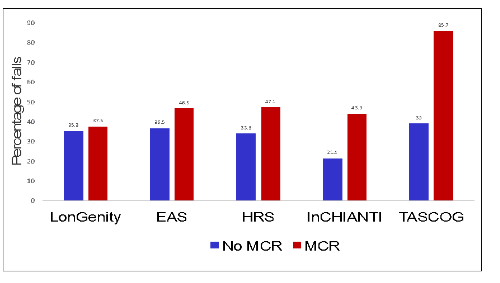Falls continue to be a major cause of injury and loss of independence in older people. Therefore, screening for fall risk is an important part of geriatric care. We previously identified that there is a cumulative effect on fall risk if people suffer from both poorer physical and cognitive function (https://www.ncbi.nlm.nih.gov/pubmed/23410920). The current study built further on these findings by only using clinical measures, which are quick and easy to administer (without the need of a qualified health professional) to make them feasible in a clinical setting. Therefore, we searched for a measure that incorporated both gait and cognition and was quick and easy to administer.
We used the Motoric Cognitive Risk (MCR) syndrome – developed by Prof Joe Verghese (Albert Einstein College of Medicine, USA) – which is characterised by both slow gait and presence of a subjective cognitive complaint, and therefore ideal for our purposes.
Our study aimed to examine if MCR increased the risk of falls and if the diagnosis of the combined MCR was a stronger risk factor for falls than its components (i.e. slow gait or cognitive complaint). Using data from five longitudinal population-based studies (n=6204), we found that 45% of participants reported a cognitive complaint, 13.8% had slow gait, 7.5% had a diagnosis of MCR, and 33.9% reported any fall (see Figure for individual study results). MCR was associated with a 44% increase of falls in the pooled analysis of all studies. This increased risk of falls of the combined MCR was higher than for gait speed (30%) or subjective cognitive complaints (25%) alone.

Figure MCR status plotted against the percentage of people who reported any fall
Reprinted from Journal of Alzheimers Disease, , 18;53(3): Callisaya ML, Ayers E, Barzilai N et al. Motoric Cognitive Risk Syndrome and Falls A multi-center study1043-52. Copyright (2016), with permission from IOS Press”. The publication is available at IOS Press through http://dx.doi.org/10.3233/JAD-160230
The simplicity and low cost of MCR makes this an attractive falls-risk screening tool for the busy clinician. People with MCR should then proceed to a more thorough multifactorial falls assessment, to understand the cause of the slow gait (e.g. balance assessment) and poor cognitive function (e.g. neuropsychological assessment), and guide a tailored intervention program.
Publication
Callisaya ML, Ayers E, Barzilai N, Ferrucci L, Guralnik JM, Lipton RB, Otahal P, Srikanth VK, Verghese J. Motoric Cognitive Risk Syndrome and Falls Risk: A Multi-Center Study.
J Alzheimers Dis. 2016 Jun 18;53(3):1043-52. doi: 10.3233/JAD-160230. http://dx.doi.org/10.3233/JAD-160230
About the Author

Dr Michele Callisaya
Brain Ageing group, University of Tasmania
Michele leads the Brain Ageing group at the University of Tasmania and is an Aged Care and Rehabilitation physiotherapist at the Royal Hobart Hospital, Australia. She motivates herself to go trail running with thoughts of improving her strength, balance and reaction time as age inevitably creeps up.
Copyright
© 2018 by the author. Except as otherwise noted, the ISPGR blog, including its text and figures, is licensed under a Creative Commons Attribution-ShareAlike 4.0 International License. To view a copy of this license, visit https://creativecommons.org/licenses/by-sa/4.0/legalcode.
ISPGR blog (ISSN 2561-4703)
Are you interested in writing a blog post for the ISPGR website? If so, please email the ISGPR Secretariat with the following information:
- First and Last Name
- Institution/Affiliation
- Paper you will be referencing
